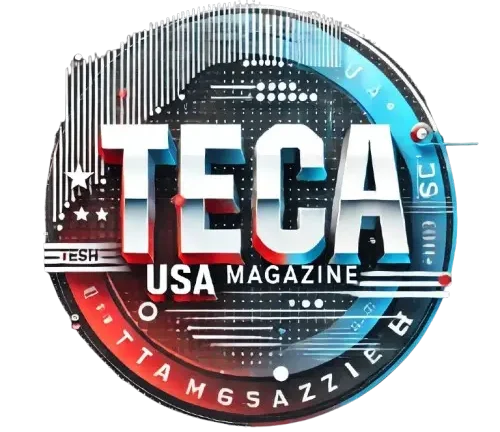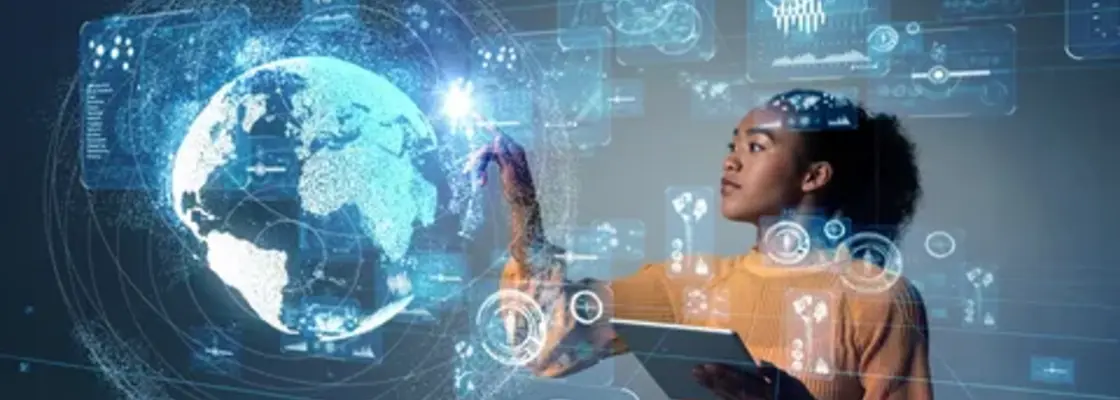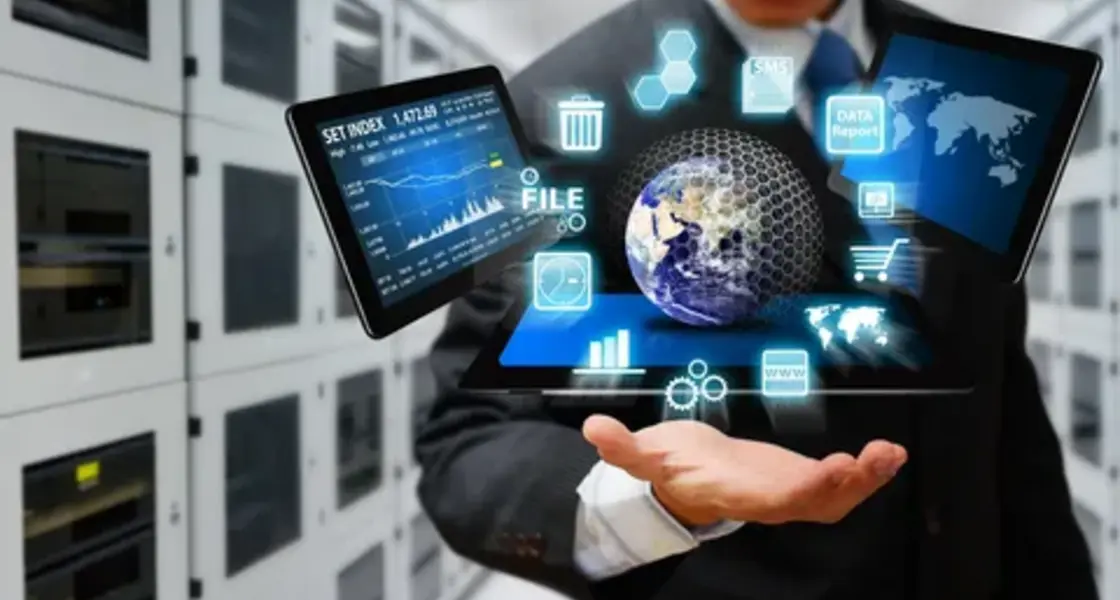What is the impact of emerging technology on how we think about the Emerging Tech and FMCG (Fast-Moving Consumer Goods) world? This is a question that affects both business and consumers with a hammer.
Have you ever thought why your shopping experience became so seamless and smart or why companies suddenly appear to be able to read your thoughts Emerging technology may be the answer.
Here’s the best part: FMCG is growing more rapidly than ever.
From AI-driven personalization and AI-driven supply chains, new technologies and FMCG are collaborating to revolutionize the way we purchase as well as sell even think about the products we use every day.
Let’s take a look, and decode what’s going on, and why you must be attentive.
What is FMCG, and Why Does Emerging Tech Matter?
First, a quick refresher.
FMCG or fast-moving consumer goods, is a reference to the products we utilize on a daily basis:
- Drinks and snacks.
- Cleansing and toiletries.
- Over-the-counter meds.
These are essentials.
They’re quickly taken off the shelves due to the fact that we’re constantly buying these items.
Then, throw the latest technology to the mix.
Game-changers include:
- Artificial Intelligence (AI).
- Machine Learning (ML).
- Internet of Things (IoT).
- Blockchain.
- Robotics and Automation.
Why is this important?
Due to the fact that FMCG companies are constantly under pressure to satisfy consumer demands quicker, less expensive and smarter.
And what about emerging technology?
It’s the only way to stay ahead of the ever-changing retail market.
How Emerging Tech is Transforming FMCG
It’s time to break down the issue in the areas where technology is causing an impact in FMCG.
1. Smarter Customer Experiences
Do you ever feel that the brands know exactly what you want, before you even know?
This isn’t magic, it’s AI or data analytics.
- Their AI powered platforms study your habits of buying to suggest items that are tailored to your needs. Consider the Amazon’s “You might also like” or a customized grocery app.
- Chatbots: 24/7 help 24/7. Bots that are powered with natural language processing could answer your questions, assist you to locate products, and even complete orders.
- Augmented Reality (AR) Augmented Reality (AR): Virtual trials of beauty products or observing how furniture will fit into your home.
For FMCG brands it’s about building trust while also maximizing sales more effectively.
2. Streamlined Supply Chains
Let’s face it: Supply chains can be a mess.
The latest technology makes them slim rapid, quick, and efficient.
- IoT Sensors are able to track goods in real-time from factory to store. Less delays, less waste.
- Blockchain: Secure and transparent monitoring of goods. Ideal for ensuring food safety and to avoid counterfeit products.
- Automation: Warehouses are run by robots. You can think faster when packing, picking and even shipping.
For FMCG businesses This means lower costs and happy customers who receive their goods on time.
3. Sustainable Practices
The consumer wants sustainability and new technology helps FMCG companies deliver.
- Intelligent Packaging: biodegradable packaging are embedded with QR codes that give information on the product as well as recycling guidelines.
- AI in Waste Reduction Predict demand to reduce excess production and to reduce the amount of waste.
- Green Logistics Green Logistics: Electric vehicle and route optimization that reduce carbon footprints.
What’s the takeaway?
It’s not just about profit-making, it’s about delivering on the values of consumers.
Examples of Emerging Tech and FMCG in Action
Let’s talk about some examples of how technology is disrupting FMCG:
1. Coca-Cola
Coca-Cola makes use of vending machines with AI that recommend drinks based upon the weather conditions and the time of day.
They’re also making use of IoT sensors to monitor the level of inventory and automatically replenish.
2. Unilever
Unilever utilizes blockchain to increase transparency in the supply chain, which will ensure sustainable sources for ingredients like palm oil.
3. Nestle
Nestle has developed smart packaging using QR codes that permit consumers to track their food back towards the source of their food.
Benefits of Emerging Tech in FMCG
What is the huge deal?
The benefits are enormous for both customers and businesses.
1. Faster, More Reliable Deliveries
Who doesn’t want to receive their goods on time?
Automation and IoT ensure that shelves are always filled, and deliveries take place without issue.
2. Personalized Shopping Experiences
No more generic advertisements or naive suggestions.
Technology ensures that every experience is custom-designed.
3. Cost Savings
Technology reduces inefficiencies, resulting in businesses save on production, logistics, and also on labor.
Savings are often transferred to you.
4. Enhanced Sustainability
Technology makes it easier for companies to be green, and customers notice.
Challenges of Integrating Emerging Tech in FMCG
It’s true that there are also obstacles.
1. High Upfront Costs
Implementing technologies such as AI, IoT, or blockchain isn’t cheap.
For smaller FMCG businesses, this could be a major deal-breaker.
2. Data Privacy Concerns
Personalization brings data collection which is a delicate issue.
The companies must make sure they manage the data in a responsible manner.
3. Tech Fatigue
Not everyone is prepared for AR programs or artificial intelligence-powered purchases.
Sometimes, simplicity is better.
What Does the Future Hold for Emerging Tech and FMCG?
The relationship between the new technology and FMCG is only just beginning.
Here’s what’s coming:
1. Autonomous Stores
Think of Amazon Go, where you purchase what you want and leave.
No lines. No cashiers. All you need is technology.
2. AI-Driven Product Development
AI can assist companies in creating new products by studying trends, feedback from customers and even the mix of ingredients.
3. Hyper-Personalized Ads
Imagine ads that are so precise they seem like conversations with someone you know.
This is where machine learning is going.
FAQs About Emerging Tech and FMCG
1. What is FMCG?
Emerging Tech and FMCG is short for Fast-Moving Consumer Goods, which include everyday items like drinks, food and toiletries.
2. What is AI utilized in FMCG?
AI allows for customized purchasing, management of inventory and even the development of products.
3. Can blockchain be used to benefit FMCG?
Yes. Blockchain provides a secure, transparent tracking of the products, specifically to ensure food safety and sustainability.
4. What’s next for the latest tech in FMCG?
You can expect more automation, more intelligent personalization, and a greater emphasis on sustainability.
Emerging Technology and FMCG Transformation: A Deeper Diving the upcoming transformation
The synergy of emerging technology as well as Emerging Tech and FMCG isn’t just a hype, it’s an entire revolution.
If the first glance piqued your interest Let’s take it to the next step by looking into specific technology, trends and case studies that are which are causing this shift.
The Emerging Tech and FMCG industry is built on speed and scale.
Technology is making more efficient, faster and more customer-centric as never before.
Here’s the complete detail:
Emerging Tech and FMCG: Key Trends Driving Change
The Emerging Tech and FMCG business thrives because it is ahead of consumer demands even while operating at very slim margins.
New technologies are emerging to tackle these problems Here are the leading trends shaping the future of technology:
1. AI-Powered Predictive Analytics
There is no longer a need to simply reacting to consumer behavior.
Today, Emerging Tech and FMCG companies use AI to forecast demand and then the stock levels accordingly.
-
How it is done: AI crunches data from the past forecasts of sales and weather trends as well as social media chatter to predict the demand.
-
The result is that retail shelves remain stocked, and warehouses are able to avoid overproduction.
For example, a drink company could increase the production of iced tea, if AI predicts a heatwave across the Midwest.
2. Direct-to-Consumer (DTC) Platforms
Tech has completely eliminated the middleman.
FMCG Brands are contacting customers directly via their own online shopping platforms.
-
Subscription Models: Brands such as Dollar Shave Club use DTC for direct shipping of products to customers according to a set timetable.
-
Information Insights: Direct selling enables companies to gather customer data and enhance their offerings.
3. Smart Retail Solutions
Shopping experiences are evolving with smart shopping the driving force.
-
Cashierless stores: Amazon Go paved the way for stores that depend on IoT AI, AI, and sensors to provide seamless shopping.
-
Digital Shelf Labels: Prices are able to be dynamically adjusted based on the demand or the time of day.
-
AR in stores: Customers can use their phones to scan items and immediately receive detailed information or virtual test-runs.
4. Digital Twins for Supply Chain Optimization
Digital twins are virtual copy of an actual system.
In Emerging Tech and FMCG this entails making a digital copy of a manufacturing facility supply chain, a factory or an entire line of products.
-
What does it mean Brands can use simulations to simulate changes, improve logistics, and identify problems without disrupting the actual system.
How FMCG is Using Emerging Tech to Solve Real Problems
The speedy nature of Emerging Tech and FMCG presents unique challenges: insufficient inventory, waste and the need to be sustainable.
Here’s how new technology is making an impact:
1. Reducing Food Waste with AI
Food waste is an enormous problem for Emerging Tech and FMCG businesses.
AI tools can now can predict expiration dates and monitor the inventory so that there is no the amount of waste.
For instance:
-
Retailers utilize smart sensors to monitor shelf conditions and prolong shelf time.
-
AI informs managers of when products are about to expire, and offers discounts to make inventory move faster.
2. Enhancing traceability using Blockchain
The consumer is concerned about where the products are sourced from.
Blockchain makes sure that each step is documented and transparent.
-
In the case of Emerging Tech and FMCG brand names, this creates confidence and helps reduce the risk of fraud.
-
For consumers, it guarantees authenticity–especially for organic or fair-trade goods.
Nestle utilizes blockchain technology to help customers track coffee beans back to the farm on which they were produced.
3. Innovation in Product Design by incorporating AI and AR
Do you want to introduce a new snack?
AI can analyse consumer preferences and trends to suggest flavors packaging, flavors, and prices.
Additionally, AR lets consumers visualize the way a product is integrated in their daily lives before purchasing.
How Emerging Tech Elevates Emerging Tech and FMCG Marketing
FMCG revolves around the mass appeal.
Today’s technology lets brands become personal, bringing marketing to a whole new level.
1. Hyper-Targeted Ads
AI algorithms sort through information from consumers to present ads that seem personalised to your personal.
For instance:
-
If you are a family-oriented shopper, you might come across ads for baby wipes that are eco-friendly.
-
People who exercise are often targeted by electrolyte drinks and protein bars.
2. Real-Time Feedback Loops
Technology is advancing to allow instant feedback collection using apps, social media or even connected IoT devices.
Companies can:
-
Make adjustments to campaigns in real time.
-
Spot underperforming products.
-
Connect with customers in a more direct way.
3. Gamification of Shopping
Gamification isn’t limited to apps, it’s becoming a part of Emerging Tech and FMCG marketing as well.
Think loyalty programs in which customers earn points simply by scanning receipts, or engaging with brands via social media.
Case Studies: Emerging Tech and Emerging Tech and FMCG Done Right
Do you want proof that this is true?
Here’s how top Emerging Tech and FMCG brands are doing it:
1. PepsiCo’s AI in Marketing
PepsiCo makes use of AI to study social media trends and forecast the next flavor craze to hit the market.
They’ve even made limited-edition snack items that are based on real-time data.
2. P&G’s Smart Supply Chain
Procter & Gamble uses IoT sensors throughout the supply chain of their business to keep track of conditions like humidity and temperature to ensure product quality in transport.
3. Walmart’s Blockchain for Food Safety
Walmart has adopted blockchain technology to monitor fresh produce from the farm to the store.
This has reduced the time required to trace food source from days to mere seconds.
Challenges Ahead: What Emerging Tech and FMCG Needs to Watch Out For
There is no revolution without increasing pains.
Here are the obstacles FMCG companies have to overcome when it comes to tech adoption:
1. Tech Implementation Costs
The deployment of new technologies at a the scale it requires isn’t cheap.
Smaller Emerging Tech and FMCGfirms may be struggling to be competitive without substantial investments.
2. Balance Innovation and Simplicity
Not everyone wants an experience that is dominated by technology.
Brands need to find the optimal balance between simplicity and innovation.
3. Privacy Concerns
Data collection helps brands customize experiences However, it also raises privacy issues.
FAQs About Emerging Tech and FMCG
1. What’s the biggest obstacle to using new technology in FMCG?
The balance between cost, scalability and trust of the consumer.
2. What are the benefits of IoT? FMCG?
IoT provides real-time tracking, intelligent stock management and more effective monitoring of product’s quality.
3. Can smallerEmerging Tech and FMCG companies afford to invest in new technology?
A lot of small and mid-sized brands as well as startups depend on plug-and play technology solutions such as cloud-based AI to remain competitive.
The Future of Emerging Tech and FMCG
The future is bright and quickly.
Here’s what to expect over the next five to 10 years:
-
Fully automated warehouses Robots can handle almost all logistics involved in Emerging Tech and FMCGchain of supply.
-
More in-depth AI Integration From recipe creation to forecasting demand, AI will take over every stage that is involved in FMCG operations.
-
Sustainability Innovation: Look for to see more innovations in eco-friendly packaging as well as green logistics.


